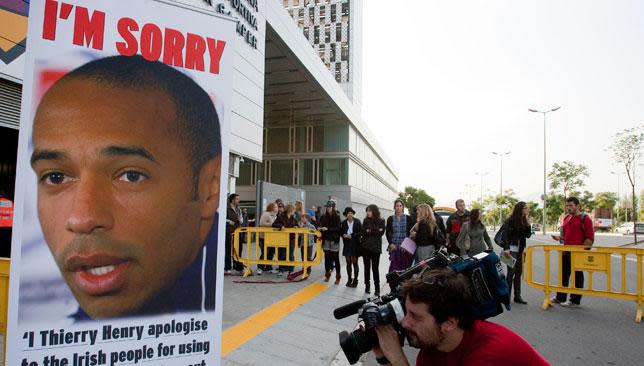Adored in England, unloved in France: Thierry Henry exits football stage left
Thierry Henry has retired. It was the case for several years already in the mind of many French supporters who accompanied his progress across the Atlantic Ocean since 2010 with indifference.
- Sport360's memories of the Arsenal legend's career
- TWITTER: Social media lauds Henry after retirement
- GALLERY: Thierry Henry's greatest career moments
His motives were questioned and are all the more scrutinized today with outsiders using the benefit of hindsight to their advantage. The self-styled King Henry did not do much to revolutionize the game in the United States, they say.
Few appear to grasp it was not his motive in the first place. He never planned to succeed where Pelé and Beckenbauer failed with the New York Cosmos. His move to America was the cultural fulfillment of a young kid who, since his early years, dreamt of the Big Apple and living the New Yorker's life one day.
Although remnants of the American Dream are still to be found among many Frenchmen of his generation, few sought to integrate and encourage the underlying emotional content of his transfer in 2010.
This cultural dimension was never really a concern for the French public. It exemplifies the difficulty many have had in identifying with France's best ever scorer (51 goals) who took part in the country's two greatest sporting achievements of recent years, the 1998 World Cup and 2000 European Championship.
When it became obvious he had played his last ever competitive game with New York last month, a handful of journalists in the French media emitted the wish to see him play one last time for the national team he gave so much to.
The idea of a late entrance in next year's friendly against Brazil was quickly brushed off by national federation president Noel le Graet, who did say he 'would think something up for Thierry Henry'.
Surely the four years of pre-retirement in the United States were enough time for the French Football Federation (FFF) to prepare an adequate tribute. However it appears not even the organisation that benefitted so much from striker's contribution felt particularly inclined to stage a final farewell.
The FFF is possibly aware the turnout might be disappointing. After all, Henry's time with the French national team will chiefly be remembered, as some national media already pointed out on Tuesday, for the infamous handball which threw Ireland out of contention for World Cup 2010.

Noel le Graet is possibly aware that the turnout for a jubilee would, as evoked, not entice large crowds. Despite an incredibly rich career with Monaco, Juventus, Arsenal, Barcelona and the New York Red Bulls, it appears Thierry Henry has already vanished from popular memory in France.
One could admittedly point at the fact he made most of his achievements outside French borders, or that his time with the French national team ended in despair after an early exit at Euro 2008 and World Cup 2010.
In spite of his achievements (he is the country's leading scorer with 51 international goals), the handball remains a persistent stain on Henry's international career even in France, although he only sought to qualify his country for a major tournament.
Good luck my friend @ThierryHenry. Soccer will miss you. Congratulations for all you have done. pic.twitter.com/Kmjl81aXjx
— Ronaldinho Gaúcho (@10Ronaldinho) December 16, 2014
The Argentinians describe Maradona's act of cheating against England in 1986 'The Hand of God'. In England, the last goal of the 1966 World Cup final is remembered all the more sweatly that it probably never fully crossed the line.
In France, Henry's handball was not just a shameful act but one that overshadowed all the positive contributions he had made for his national team down the years.
There is no denying he should not have used his left hand to correct the ball's trajectory in the build-up to William Gallas' goal on November, 18, 2009. However the constant bickering at his low points is a testament to how little the public opinion feels for him.
The same goes for his time in New York, when there was less coverage on his outlandish excursions in the more vibrant parts of the city as there was for the €10.8 million triplex he bought in Soho for himself and his family.

He admittedly achieved most of his success outside French borders, having left AS Monaco in January 1999 aged 21 and never returned to club football in France. However the malaise with him lies deeper, in the French public's general perception of its football players and successful people (in sport and business alike).
It is as if the country's own sense of identity, its self-perception, was harmed by a complete inability to admire.
The same went for Zinedine Zidane after his headbutt on Materazzi in 2010, and hints at the more general observation that no single public figure appears to be universally admired in France today.
Louis Saha, his former team-mate with the France national team, told Sport360 he was sad that Henry gave so much to French football, which in turn gave him little back. He would almost be forgiven for asking whether French football truly deserved a player of Henry's stature, or more accurately, how long it will take before the country produces a player quite like him - and brings him down.

 Yahoo News
Yahoo News 
